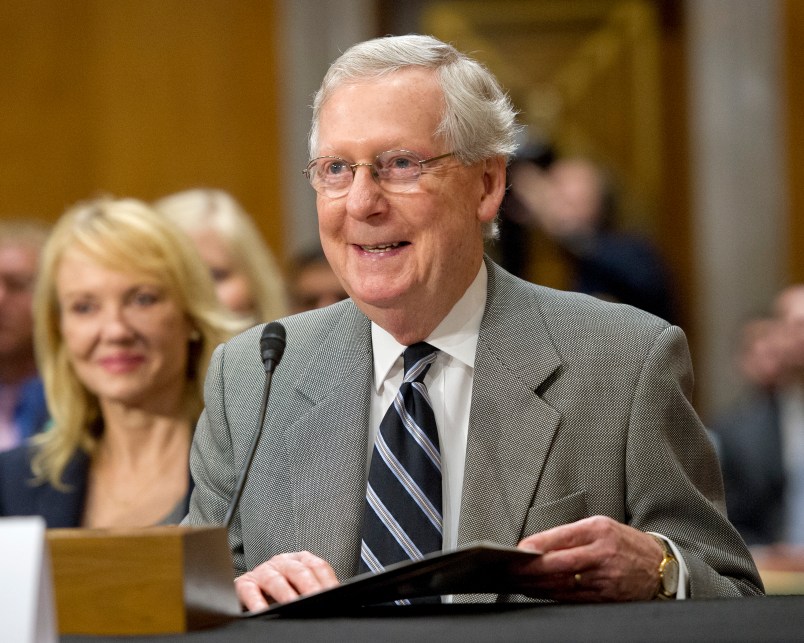Despite no single Republican health care proposal on the table clearing the bare minimum 50 vote-threshold for passage, the Senate is planning a vote to put a bill on the floor — and potentially, all the competing bills — early next week.
Since his acknowledgement that the Obamacare replacement bill the GOP Senate has been negotiating for weeks has failed to win over 50 supporters in his caucus, Majority Leader Mitch McConnell’s message to members has focused on the necessity of at least getting a debate open on the floor for any health care bill.
The best Republicans may be able to hope for is a series of votes that signal what would have been their preferred approach, so if the final bill fails, they can point the blame at other members.
“We just need to get on the question and then lay out the best thing we have 50 votes for,” Sen. Mike Rounds (R-SD) explained to reporters, saying both a revival of the 2015 repeal-and-delay model and the embattled Better Care Reconciliation Act will be up for debate.
But whether the Senate will even be able to “get on the question”—via a motion to proceed vote—is uncertain. With Sen. John McCain (R-AZ) afflicted with brain cancer and unable to travel, leadership can only take one defection from its 51 remaining members.
On Thursday, Sen. Susan Collins (R-ME) appeared to remain staunchly opposed, despite efforts to throw waivers and additional money to cushion the massive Medicaid cuts that would hit her state. “If you’re still going to take 700 billion dollars out of the Medicaid program, I think you still have a significant problem,” she said.
Sen. Shelley Moore Capito (R-WV) sounded similarly skeptical in a local radio interview where she accused the plans under consideration of “crushing Medicaid.”
On the other end of the party’s political spectrum, Sen. Mike Lee (R-UT) said he is willing to defy his party and vote to block debate if he feels the options on the table do not go far enough in repealing Obamacare’s taxes and regulations.
Even those who voted to repeal the Affordable Care Act as recently as 2015 are openly saying they are willing to break with their party and reject the same bill today, and a round of threats and cajoling from President Trump is having little to no impact. Other senators complained that the don’t want to vote to proceed without knowing exactly what they’d be proceeding to.
A new report from the Congressional Budget Office did not help matters—finding that despite spending tens of billions more than the previous iteration to help low-income people afford health care, the Senate’s Obamacare replacement bill would result in 22 million more people uninsured over 10 years.
But despite the looming prospect of failing once again to deliver on eight years of promises to repeal Obamacare, Republican senators seem eager for a vote, saying it was important to get every member “on the record” before going back to their districts to face the music.
“We’ve got to have a vote,” Sen. Richard Shelby (R-AL) told reporters this week. “We promised to vote for repeal, so let’s vote for repeal.”
The upcoming vote-a-rama, regardless of the outcome, allows both conservatives and moderates to go home saying they kept their promise, whether that promise is protecting Medicaid and people with pre-exisiting conditions, or voting to repeal the Affordable Care Act. Some Republicans have already admitted that the dozens of votes they took to repeal Obamacare under a Democratic president they knew would veto it were pure messaging votes —”fantasy football” in one lawmaker’s words. This vote could serve the same purpose, and considering the deep unpopularity of the Senate’s Obamacare replacement plan, they may be more damned politically if it passes than if it fails.
Still, that doesn’t make Republicans cheery about the prospect of next week’s vote going down in flames.
“When you can’t even get votes to go to a motion to proceed, you’re in pretty bad shape,” grumbled Sen. Pat Roberts (R-KS) to reporters on Thursday.
Asked what a unsuccessful vote would say about Republicans’ ability govern, he quipped: “Not much.”







I don’t believe there will be any vote unless they think they have the 50 votes to proceed. And I don’t think Collins especially, and very likely Caputo are budging.
Ryan insisted their would be a vote on their failed bill all the way up until it was time to vote and then it was pulled. I think that happens here.
I think Lee is like Paul; preening and looking for the first opportunity to fall in line.
My guess is a handful of others would vote ‘no’ if forced (Portman?) but more than happy to let Collins and Caputo do their dirty work.
“We’ve got to have a vote,” Sen. Richard Shelby (R-AL) told reporters this week. “We promised to vote for repeal, so let’s vote for repeal.”
How do you kill a zombie health care bill? No - not a riddle. Really, how do you make them truly dead? Put them on a Republican health care plan? (maybe it is a riddle)
I see your chimp, and raise you an orangutan…
https://www.youtube.com/watch?v=FIxYCDbRGJc“before going back to their districts”
These are Senators. They are elected state-wide. Aren’t political writers supposed to know this?
Oh, and how can they tout any legislative action if they WON’T EVEN HOLD A FUCKING TOWN HALL BECAUSE THEY ARE A BUNCH OF PANTS-PISSING COWARDS?